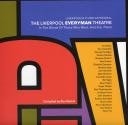Everyman History
Founded in 1964 in the appropriately named Hope Hall (once a chapel, then a cinema), in an area of Liverpool noted for its bohemian environment and political edge, the Everyman built a reputation for ground-breaking work.
A succession of visionary directors, exciting writers and bold acting companies have kept the theatrical flame alive here for decades, and the Everyman has been the crucible for an astonishing range of theatrical talent. Julie Walters, Bernard Hill, Jonathan Pryce, Pete Postlethwaite, Alison Steadman, Antony Sher, Bill Nighy, Alan Bleasdale, Willy Russell, Barbara Dickson, Matthew Kelly, Cathy Tyson, David Morrissey, Stephen Graham and the Liverpool Poets all considered the Everyman a formative home in their early years.
In 2000, the Everyman joined forces with the Playhouse to become Liverpool & Merseyside Theatres Trust (LMTT) and, in 2003, Gemma Bodinetz (Artistic Director) and Deborah Aydon (Executive Director) were appointed as joint Chief Executives to lead the company.
In recent years the Everyman has undergone a radical transformation and in March 2014, after ten years planning and two years construction, a brand new incarnation of this pioneering and much-loved theatre opened with a joyous production of Shakespeare’s Twelfth Night, directed by Gemma Bodinetz. The new theatre, designed by Haworth Tompkins, is acclaimed by audiences and artists alike. In 2014, the Everyman was awarded the RIBA Stirling Prize, the first theatre in the UK and the first building in Liverpool to win the most prestigious award for British Architecture.
You can find out more about the journey to the new Everyman here.

The Everyman Archive is held at Liverpool John Moore's University as part of its Special Collections & Archives in the Aldham Robarts Learning Resource Centre (LRC). You can search the online archive database at archives.ljmu.ac.uk.